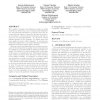Free Online Productivity Tools
i2Speak
i2Symbol
i2OCR
iTex2Img
iWeb2Print
iWeb2Shot
i2Type
iPdf2Split
iPdf2Merge
i2Bopomofo
i2Arabic
i2Style
i2Image
i2PDF
iLatex2Rtf
Sci2ools
104
Voted
SPAA
2009
ACM
2009
ACM
Distributed algorithms for QoS load balancing
We consider a dynamic load balancing scenario in which users allocate resources in a non-cooperative and selfish fashion. The perceived performance of a resource for a user decreases with the number of users that allocate the resource. In our dynamic, concurrent model, users may reallocate resources in a round-based fashion. As opposed to various settings analyzed in the literature, we assume that users have quality of service (QoS) demands. A user has zero utility when falling short of a certain minimum performance threshold and having positive utility otherwise. Whereas various load-balancing protocols have been proposed for the setting without quality of service requirements, we consider protocols that satisfy an additional locality constraint: The behavior of a user depends merely on the state of the resource it currently allocates. This property is particularly useful in scenarios where the state of other resources is not readily accessible. For instance, if resources represent ...
Related Content
| Added | 19 May 2010 |
| Updated | 19 May 2010 |
| Type | Conference |
| Year | 2009 |
| Where | SPAA |
| Authors | Heiner Ackermann, Simon Fischer, Martin Hoefer, Marcel Schöngens |
Comments (0)

